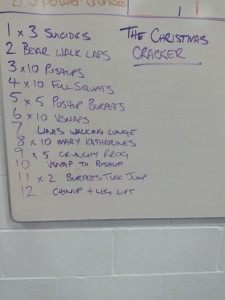 I’m not fearless I just know fear is false…
I’m not fearless I just know fear is false…
There is a saying that you should do something every day that scares you. When you get past your 30’s getting out of bed should count for that thing, but since it doesn’t we usually don’t come across fear very much in our lives. How then can we relate to the athlete that is fearful of doing a new skill? Well, in my most basic mind I think “Suck it up, I had to, you can too” without realizing that in as much as I seem normal, I am in truth an exception. It’s not to say that I am exceptional (although there have been times when I was) what I mean is that over the years, and starting at a very young age (pre 16 years) I have developed a very strong control over the tricks I allow my mind to play. Fear, after all, is a trick your mind plays on you to prevent you from hurting yourself, it’s the most basic of self preservation. However, the brain is a bit of a sissy and it will over-react to most things. With that in mind you have to take what that voice inside your head is saying with a grain of salt or in my case a box of salt. I have an often quoted page I wrote about fear and “doing the work” and the part I like to quote the most is this:
This is something I wish someone had told me in simple terms when I was younger. Instead I learned it from coaches who drove us into the ground on the rugby pitch, drilling us with merciless laps, sprints and piggybacks up tall grassy hills. It was those experiences and the results gained that drove into me the importance of doing what you are told, no matter how hard, no matter how painful it is, you will always succeed if you just do the work. There is a whole industry built around this theory, shirts, advertising campaigns, soft drinks, power drinks, protein bars, and almost everything else that can benefit from being tied to being healthy promotes pushing yourself to the limit. But it’s not the limit that you need to worry about, it’s your brain that you should be wary of.
The key here is to stop listening to yourself and realize that your brain, the couch potato that it is doesn’t really want to do much of anything, especially something that is hard or potentially dangerous. At 16 years old I flew a powered glider solo for the first time. I was scared out of my mind but I already had the mentality that if I wanted to do something amazing I was going to have to be something extraordinary. That achievement is something I still talk about decades later, it meant that much to me and it is probably the one thing that taught me that you can truly do anything you want if you are courageous enough. In my current life I face fear every day during my workouts, I have a history of back problems and a longer history of pushing myself beyond what some might call reasonable. That is why I still bench press 400lbs without a spotter, not because I have to but because it reminds me of what it is like to be scared. That feeling of fear is what produces the adrenaline that gets me through the set. Without the fear and adrenaline there would be no way I could do that kind of weight. Without fear, there is no courage…
We live lives fraught with danger, crossing the road, driving a car, riding transit, we put our faith in the skill and care of others with unwavering faith so many times, then why is it that when you have a coach who could dunk you that you refuse to let go of the bar doing flyaways? Is it really a fear of the skill? I think we know that is not the case since nobody gets to the point of doing flyaways or sole circles or giants without having done hundreds of drills and repetitions beforehand. So if it’s not the skill, what is it? It’s not the coach, for most kids the trust that they have in the coach (although they may not admit it) is is enormous, every back tuck they do, every twisting layout they try, any time they throw complex skills while the coach spots is saying “I trust you” and in turn the coach is saying to the athlete, “You can trust me, I promise to protect you”.
So that being said, where does the remaining fear come from? It comes from your inabilty to forsee a positive outcome. It comes from the lack in confidence that the unknown is a safe place. It comes, at a most basic level, from the voice in your head that can’t imagine your ability to succeed. That basic self-preservation has no gray areas, it’s not likely to make quality decisions, after all, it’s job is to keep you safe and much like parents on their child’s first day of school, breaking that protective bond is terrifying. But let’s give a shout out to logic here. Emotions are what give us quality in our lives, it’s what make us happy, loving, sensitive caring people. But it’s also what makes us paranoid, frightened and reclusive. Which one we choose is exactly that, it’s a choice. We choose to be fearful without even thinking that maybe the more beneficial choice would be to try a little courage on for size and to reap the emotional reward that comes with staggering achievement. And don’t kid yourself, once you have chosen to ignore the fear and go for it, the result is truly staggering because you have just overcome millions of years of evolution to do something that you wanted more than you feared.
There is no easy way to this point. It has to come from experience because nobody except you can control that inner voice of yours. Nobody can magically make the voice go away but with a little practice you can learn to ignore most of what it says. So next time you are stuck with a skill, fearful of a fall or worried about the work just remember, your coach has one job above all else and that is to help and protect you. But no matter how much support and encouragement they give, you won’t be able to hear it until you tell that voice to be still.
Bravery isn’t the absence of fear. It is the acceptance of the dangers, the acknowledgement of the challenge and the unwavering faith in your ability to perform. It is the courage to stand up for yourself in the face of doubt and to emerge triumphant. It is truly the champion’s path to greatness.
“I learned that courage was not the absence of fear, but the triumph over it. The brave man is not he who does not feel afraid, but he who conquers that fear.” – Nelson Mandela
 It’s December 22 and 2 days ago I managed to increase again up to 365 on bench. I can’t believe how fast mu numbers are increasing and I will share a bit of my schedule so we can see how its working…
It’s December 22 and 2 days ago I managed to increase again up to 365 on bench. I can’t believe how fast mu numbers are increasing and I will share a bit of my schedule so we can see how its working…


 This round has been a little less structured than I would have liked, at times i have felt like I was just barely hanging on to the schedule by my fingers. I know what the theory is behind what I am doing but the amount of flexibility has made it seem chaotic. After the 30WOD round I thought I would welcome a bit of leeway but as it happens it appears as though I have been rotating workouts like this:
This round has been a little less structured than I would have liked, at times i have felt like I was just barely hanging on to the schedule by my fingers. I know what the theory is behind what I am doing but the amount of flexibility has made it seem chaotic. After the 30WOD round I thought I would welcome a bit of leeway but as it happens it appears as though I have been rotating workouts like this:


